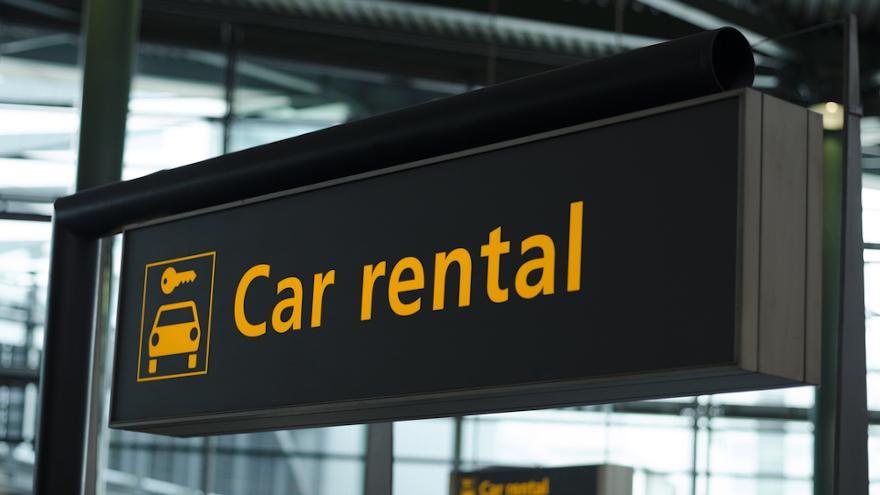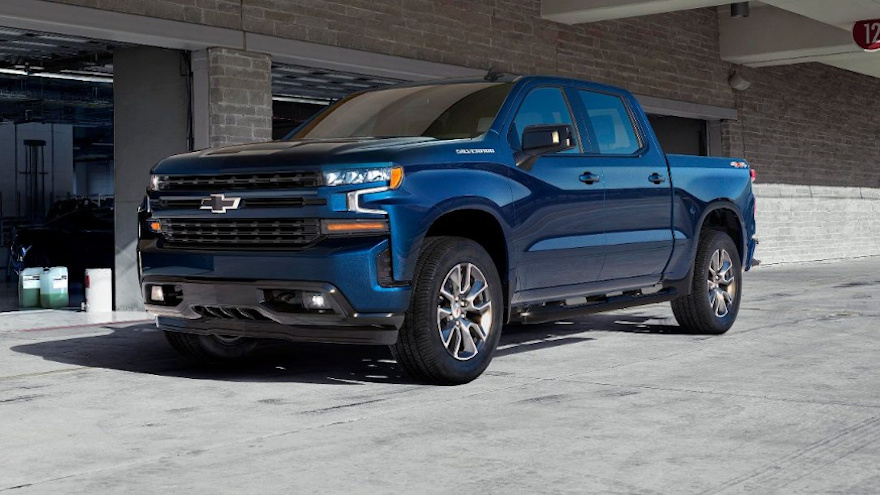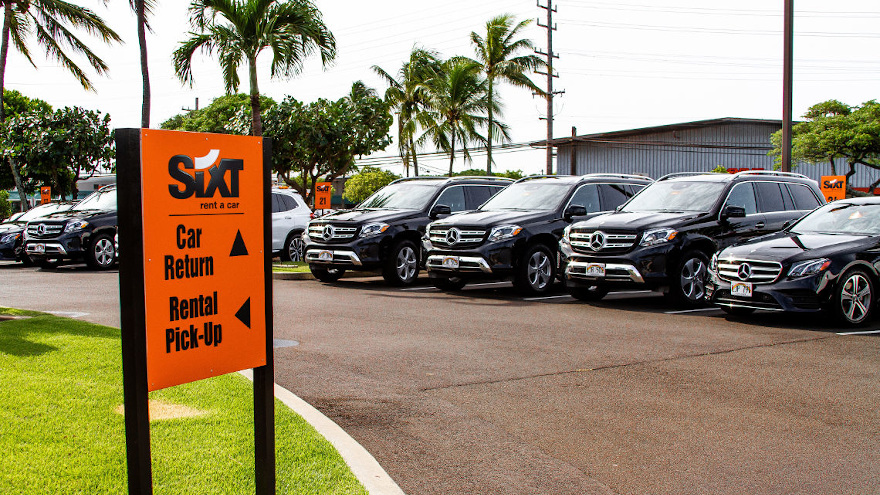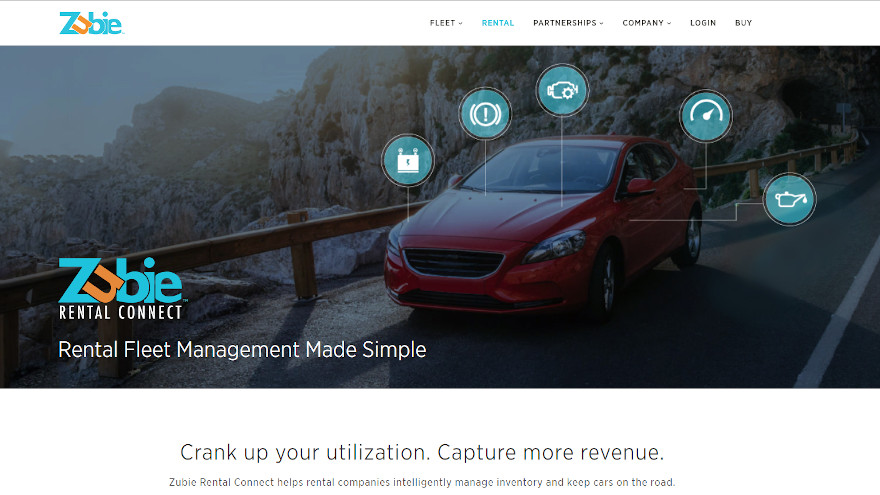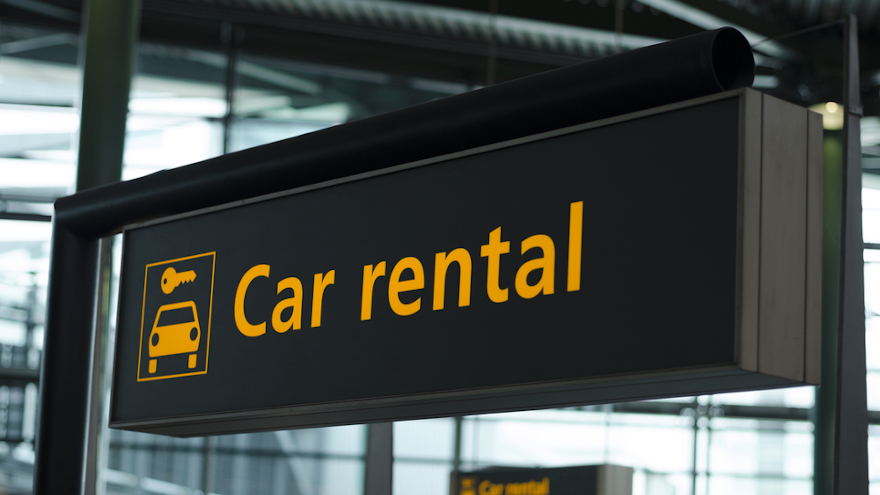Michael Taylor says travel suppliers have seen major challenges during the current challenging economic times. That has definitely been the case with the car rental industry, he said.
“Despite these economic headwinds, the major rental car companies have been able to maintain high levels of customer satisfaction throughout the pandemic, largely through great customer service and enhanced cleaning protocols to build confidence with travelers,” said Taylor, who is travel intelligence lead at J.D. Power, in a news release.
J.D. Power on Wednesday released its 2020 North America Rental Car Satisfaction Study, and the study ranked airport-based rental car companies on customer satisfaction. Ranking highest was Hertz, with a score of 852 on a 1,000-point scale.
Overall, customer satisfaction with airport-based rental car companies is 841. J.D. Power said that is statistically flat compared with 2019’s record-high performance.
After top-ranked Hertz, Enterprise placed second with a score of 849. Alamo followed at 848, and National placed fourth at 845.
As rental car companies focus on profitable revenue growth, productivity, cost control, and fleet management, they should also place a strong focus on serving their customers, J.D. Power stated.
“Rental car companies that understand their customers’ expectations and rental experiences are better positioned to target performance improvement initiatives that may increase overall customer satisfaction, brand loyalty and advocacy, and maximize sales,” J.D. Power stated.
The study, which also identifies strengths and weaknesses for each rental car company, is continuously fielded throughout the year. The study is based on responses gathered from September 2019 through August 2020, from 7,364 business and leisure travelers who rented a vehicle at an airport location from August 2019 through August 2020.
J.D. Power 2020 North America rental car satisfaction study:
Overall customer satisfaction index ranking (based on a 1000-point scale)
Hertz: 852
Enterprise: 849
Alamo: 848
National: 845
Industry average: 841
Dollar: 836
Thrifty: 835
Avis: 834
Budget: 818
SOURCE: J.D. Power.
Used-car prices are up. Consumers have multiple sources to choose from for buying a used car. In that environment, consumers should examine all their options when trying to save money and find the best deal on a used vehicle.
To help, car search engine iSeeCars.com conducted a study analyzing more than 8.5 million used-car sales across the three dealer types: traditional local dealerships: virtual dealerships, and rental car companies.
The result? iSeeCars found the greatest savings — with an average of 1.6%, or $303 — came consistently from rental car dealers. The study found that local dealerships are priced close to market value.
Virtual dealerships, the study found, are priced above market value.
“Because rental car companies buy their cars at a high volume and at a discounted rate, they’re able to sell these vehicles for less to consumers, and they price the vehicles to sell in order to move their inventory quickly,” iSeeCars executive analyst Karl Brauer said in a news release.
Brauer continued, “Additionally, rental car companies are also more likely to discount their vehicles given the financial hardships they are facing from the COVID-19 pandemic.”
Popular vehicles: The best places to buy
To determine the average savings at each major dealership type, iSeeCars analyzed used car transactions among the top 25 best-selling vehicles.
Of those 25, 13 have the greatest savings at rental car agencies. Brauer said more than 98% of used-car inventory at rental car companies is three years old or newer.
“So these deals will only apply to shoppers looking for newer-model-year versions of these vehicles,” Brauer said.
Six vehicles on the list are not commonly offered by rental car agencies. Those include the GMC Sierra 1500, the Honda Accord, the Honda CR-V, the Jeep Wrangler, the Subaru Forester and the Subaru Outback.
Brauer said that although those vehicles are still sold at rental car companies, the frequency and choice will be limited.
Six vehicles commonly found across all three retailer types do not have the most significant savings at a rental agency. Brauer noted that the Ford Escape shows the most savings virtually. Although the Ford Fusion and Hyundai Tucson are priced above market value at all three dealership types, they have the smallest increase at local dealerships, he added.
On average, he said consumers are most likely to find deals on the Mazda CX-5 at traditional local dealerships, “while the Toyota Corolla and the Toyota Tacoma have the lowest increases above market value,” he said.
Rental Agencies: These are the best popular cars to buy
iSeeCars studied which popular vehicles show greater-than-average savings at rental car companies. iSeeCars also determined the average price discount for each vehicle.
The Chevrolet Silverado 1500 pickup truck is the vehicle with the greatest savings at rental car companies. That vehicle showed a 6.6% savings at rental car companies, amounting to $2,016.
“With truck demand particularly high over the last several months, it can be tough to find a good deal. Consumers looking for a late-model, full-size used truck should consider local rental car sales inventory,” Brauer said.
Two popular sedans also offering strong savings when consumers purchase through a rental car dealer are the Honda Civic and the Nissan Altima.
Brauer said that although sedans have seen an overall decline in market share, those models are still popular rental options. Through a rental car dealer, consumers can save money on these vehicles.
In addition to savings, other benefits of buying a used rental car include that rental cars follow routine maintenance schedules, Brauer said. They also undergo routine inspections for cosmetic damage, he added, noting that all Hertz and Enterprise vehicles see a strong inspection process from certified mechanics. Those vehicles come with a 12-month/12,000 mile limited powertrain warranty, he said.
But even with the benefit of savings, buying from a rental car company has its limitations. Those vehicles can have higher mileage and more wear and tear. That is because many rental car drivers might not be as careful with the vehicle as they would be with their own car, Brauer said.
“Rental companies also typically buy the base model of a vehicle, so consumers who want higher trim levels may have difficulty finding the specific version they want,” Brauer said.
Online dealers: The best popular cars to buy
The average used car is priced 2.4% above market value at online dealerships.
But iSeeCars says three popular vehicles sold online offer discounts below market value. Those popular vehicles show the greatest average savings when purchased at an online dealership. They are the Ford Escape, the Chevrolet Equinox, and the Jeep Grand Cherokee.
Generally, the savings at online dealerships are not as significant as at rental car companies, Brauer said.
“But consumers should consider online dealers if they want a slightly older vehicle with relatively low mileage, or if there isn’t a rental car sales company in their area,” he said.
Brauer continued, “Additionally, online dealerships typically sell off-lease, one-owner cars, and Carvana and Vroom only sell vehicles with clean vehicle histories that haven’t been in an accident.”
Online dealers offer the convenience of delivering a vehicle right to a shopper’s door. They also thoroughly inspect their vehicles and offer free protection plans, according to iSeeCars.
Consumers not satisfied with their vehicle have a five- to seven-day return window, which Brauer said can help ease anxiety about not being able to test drive the vehicle prior to purchase.
But challenges also exist with the process of buying from an online dealership, including the fact that customers can’t do a traditional test drive. Also, the dealers use no-haggle pricing, which leaves no room for negotiation, Brauer said.
Local dealers: The best popular cars to buy
In also looking at the sale of popular vehicles at traditional local dealerships, iSeeCars found the average used car is 0.2 percent above market price at these dealerships, or “essentially equal.” But 10 popular vehicles sold locally offer savings below market value. Those popular vehicles provide the most savings when a customer purchases from a traditional local dealer. They include the Subaru Outback, Subaru Forester and Mazda CX-5.
“Traditional dealerships have more inventory than online dealerships and car rental agencies,” Brauer said.
He continued, “Shoppers looking for a specific vehicle in a certain color or trim will find more variety at these dealerships. Additionally, traditional dealerships devote more of their inventory to older vehicles, making them the best option for consumers seeking vehicles more than 5 years old.”
Consumers buying a used car from any type of dealer should always conduct research and follow steps “to make sure a good deal isn’t too good to be true,” iSeeCars wrote.
Brauer promoted iSeeCars’ VIN check report and other online tools, which he said provide information to help consumers find the best car at the best price. Vehicle buyers, he said, should obtain a vehicle history report and get an inspection by an independent mechanic.
Best places to buy a used car
| Dealer type |
Avg Price to Market Value ($) |
Avg Price to Market Value (%) |
| Rental Car Dealers (Hertz, etc.) |
-$303 |
-1.6% |
| Traditional Local Dealerships |
+$31 |
+0.2% |
| Online Dealerships (Carvana, etc.) |
+$444 |
+2.4% |
Data from: iSeeCars.
KAR Global chief economist Tom Kontos returned to the Auto Remarketing Podcast to discuss how much off-rental units might impact wholesale volume and pricing as turbulent 2020 continues.
Kontos also touched on other factors that he and his team are watching that could influence both the wholesale and retail markets going forward.
To listen to this episode, click on the link available below, or visit the Auto Remarketing Podcast page.
Download and subscribe to the Auto Remarketing Podcast on iTunes or on Google Play.
The Advantage Rent a Car bankruptcy gave SIXT a chance to enhance its U.S. footprint for renting its premium fleet of vehicles.
According to a news release distributed just before the holiday weekend, a Delaware bankruptcy court approved SIXT taking over 10 airport branches in the United States from Advantage Rent a Car. Starting most likely in mid-July, SIXT said it will receive the airport concessions at the strategically important locations at Boston (BOS), New York (JFK and LGA), New Jersey (EWR) and Houston (IAH).
SIXT also said it will also be renting its premium fleet in Orlando, Fla. (MCO), Denver (DEN), Maui, Hawaii (OGG), Honolulu (HNL) and Las Vegas (LAS) directly in the airport terminal.
“SIXT thus offers its private and business customers an even better network and shorter distances for a comfortable journey,” the company said.
The company went on to note the expanded branch network in the U.S. rounds off SIXT’s offering for business and private customers and creates a basis for new growth potential.
SIXT is thus continuing to tap into one of the most lucrative markets in the rental segment. With a huge market volume of more than $36 billion, SIXT pointed out the United States is currently by far the largest growth market for the mobility provider.
The company indicated the acquisition of the new branches alone holds great potential, as the volume of the 10 airports in total is estimated at around $3.4 billion. This figure roughly equals the total potential of the rental car business in Germany, according to the SIXT.
SIXT went on to mention the current circumstances caused by the coronavirus crisis and the insolvency of the car rental company Advantage offered SIXT a unique opportunity to acquire the 10 highly coveted airport concessions at an attractive price.
Through this investment, SIXT managing board member Alexander Sixt highlighted that the company is gaining access to travelers in airports who otherwise would have been difficult to reach for years or even decades.
“With this highly pragmatic transaction, we have taken a very decisive strategic step towards building a nationwide network in the world’s largest car rental market,” Sixt said. “The acquisition of the concessions for all New York airports as well as for Boston, Orlando and Las Vegas, among others, lays the foundation for substantial growth after the crisis.”
Car dealer consumer-focused rental and rent-to-own technology provider DriveItAway has found that replacement vehicle demand still exists from consumers, particularly in “stay-at-home” states.
“Yet both consumers and dealers want to comply with the social distancing laws and not endanger their health,” DriveItAway founder/chief executive officer John Possumato said in a news release.
He continued, “Nor during these uncertain times do folks want to jeopardize their financial health in laying out a large amount of cash or making a long-term financial commitment.”
To meet the challenges car dealers and consumers face in the current coronavirus environment, DriveItAway has adapted its app-based platform.
The app allows for fully remote “touchless” rental contracting and payment, meaning no person-to-person physical interaction is required, Possumato said.
He added that the company has engineered its transactions to be a rent-to-buy model, “so we can have anyone drive today with an option to buy at a later time, with a substantial amount of the rental fee going towards the ultimate purchase should they chose to exercise the option to buy.”
DriveItAway says its program offers a fully in-app rental with an option to purchase.
With that option, any dealer can allow a customer the ability to choose any used vehicle in inventory, and rent it with a purchase option with some or all of the rental payment applied toward the agreed-upon purchase price of the vehicle. The dealer can then arrange for vehicle delivery to the customer’s home, and all contracting, payment and terms are inside the app.
“We saw that many car dealers now are prohibited from selling cars or are limited to online sales only, while vehicle rental companies are allowed to do business, so we quickly adapted our rent-to-purchase model to both comply with current state restrictions, and most importantly, focus on the customer needs of a social distancing and limited financial commitment, with remote delivery and an optional buy out where rental payments go towards the purchase price if the option is exercised,” Possumato said.
DriveItAway described the three steps of the proprietary program for a consumer:
1. Pick the vehicle desired out of any dealer’s used car inventory online. Then call, email or text the dealer to establish the all-in-one monthly fee, which includes insurance and maintenance. Also establish the sale price option, with part of the monthly payment applied and deducted from the sale price, if the purchase option is exercised in the future.
2. The vehicle and monthly rental rate, amount of the rental applied in credit toward the purchase (should the renter want to purchase), and terms, are placed on the DriveItAway app. On the app, the renter can digitally establish all rental terms and payment.
3. DriveItAway delivers the clean, disinfected vehicle to the customer’s door. From a distance, the delivery coordinator will validate identity (with the license information in the app). The coordinator will confirm a vehicle condition walk around. No paperwork or direct contact is necessary, and that means no need for close interaction.
DriveItAway says its program combines the best of a rental, a purchase and a lease. Customers get the vehicle they choose, make no long-term financial commitment, keep their cash, and spend nothing on maintenance and repairs, with the option to buy the vehicle. A portion of their past payment is deducted from the purchase price.
“DriveItAway can operate in all 50 states but does not yet have dealers in many areas of the country,” Possumato said.
He added that anyone who wants to use the program, but his or her chosen dealer is not yet affiliated with the DriveItAway platform, he or she can ask the dealer to contact DriveItAway, “and we will on-board them immediately.”
Possumato said no start-up cost or membership fee is required for the dealer or consumer to use the DriveItAway app or platform during the crisis period.
“We are all in this together. Let’s all help each other,” he said.
In promoting Chrissy Taylor to chief executive officer, Enterprise Holdings said that she will oversee its global strategy and operations.
Taylor, who was previously president and chief operating officer, becomes the fourth chief executive officer in the company’s more-than-60-year history.
She also represents the third generation of Taylor family chief executive officer leadership. Her father, Andy Taylor and grandfather Jack Taylor preceded her as chief executive officer, and Pam Nicholson has held the position since 2013. Pam Nicholson will retire at the end of the year.
Taylor will perform her role for a company that, along with its affiliate Enterprise Fleet Management, offers car rental, carsharing, truck rental, fleet management, retail car sales and other transportation services.
Through its integrated global network of independent regional subsidiaries, the company owns and operates the Enterprise Rent-A-Car, National Car Rental and Alamo Rent A Car brands.
Enterprise said Chrissy Taylor will become one of the highest-ranking women among the world’s largest travel companies.
Also, based on company revenue, she will be one of the top female chief executive officers across all industries, according to Enterprise, which said she will also retain her current title of president.
Taylor joined the Enterprise Rent-A-Car Management Training Program to begin her career. She started out working in the field at various rental locations.
She moved to Enterprise’s corporate headquarters in 2003, overseeing regional operations throughout the United States.
Taylor relocated to London in 2006 to further develop Enterprise’s market in the United Kingdom, Germany and Ireland.
In 2010, Taylor joined Enterprise Holdings’ Treasury group. She assisted the group in the financial restructuring of the company’s fleet management business.
The company named her executive vice president and chief operating officer in 2016, and she became president in 2019.
“With her hands-on and diverse experience at all levels of the company, Chrissy is well-prepared to take Enterprise into its next era of success,” Enterprise executive chairman Andy Taylor said in a news release.
He continued, “Grounded in our founding values, she has unmatched passion and a strong vision for the company’s next chapter. Chrissy has the full support of the board and the family.”
“Chrissy is the epitome of the Enterprise culture – always customer first, with a dedicated focus on team work,” said Enterprise Holdings board member David Kemper, who is also chair of the nominating committee.
Kemper added, “It’s been a pleasure to watch her evolve into the strong and thoughtful leader she is today. She will be a terrific CEO.”
“It is an incredible honor to be named CEO and lead our talented team of employees,” Chrissy Taylor said.
She continued, “I’m grateful for the outstanding leaders who have entrusted me to build on their accomplishments and fully committed to ensuring the business is successful for another 62 years and beyond. I look forward to working with our team to not only evolve with the mobility industry but also to help shape it, finding new and innovative ways to make travel easier and more convenient for customers.”
Serving on the board of her family’s foundation, the Crawford Taylor Foundation, Taylor will continue to serve as a member of Enterprise Holdings’ corporate board.
Since Zubie introduced Zubie Rental Connect early this year, the company has built a partner network that includes software companies TSD, Collateral Consultants and Karz.
On Friday, connected-car platform Zubie announced a new integration that it says will give rental fleet and loaner car operators “seamless access to connected car insights and the ability to improve business operations.”
The new partnership is with Bluebird Auto Rental Software, a software provider for vehicle rental companies. This partnership integrates Zubie telematics data within Bluebird’s RentWorks software platform.
Through the partnership, Bluebird customers will now have access to Zubie’s rental and loaner fleet management features. Zubie said that helps them protect their assets and optimize their business. Features include fleet monitoring, location, and recovery capabilities. Other features improve check-in, lot management, and real-time fuel and odometer capture.
With Bluebird’s integration, its customers will be able to access this information from within the RentWorks platform.
“By integrating Zubie Rental Connect with existing information and service partners, we make telematics more accessible and far more valuable for our loaner and rental fleet customers,” Zubie chief executive officer Gary Tucker said in a news release.
Tucker continued, “We’re excited to add Bluebird to the rental car industry’s most extensive telematics partner network.”
Zubie’s end-to-end connected-car technology since 2012 has delivered real-time information about vehicles and drivers to help businesses manage their fleets.
Technology-laden vehicles present a double-edged sword for rental car companies, according to a new J.D. Power study. Rental car satisfaction scores are highest when vehicles have 21 or more features, such as cruise control, GPS, UBS ports and premium sound systems.
But those scores fall 140 points when renters say that vehicle features are difficult to use.
That is one finding of the J.D. Power 2019 North America Rental Car Satisfaction Study, released on Wednesday.
Hertz ranked highest in overall satisfaction.
The study notes that as airport-based rental car companies see increased competition in all areas. They have “doubled-down on innovation,” according to the study. Those companies now offer more vehicle choices, personalized service and streamlined pick-up and return processes.
And that innovation is resonating with customers, J.D. Power said.
An additional finding of the study is that overall rental car satisfaction is at its highest level ever, and the gap in performance between the top- and bottom-ranked performers has narrowed to just 31 points. That is down from 51 points in 2018. Now, just one point separates the top two companies in the study.
A key differentiator: A smooth pick-up process. That area shows significant variation in customer experience. Overall satisfaction scores are 33 points higher when customers get their vehicle in 15 minutes or less, but that happens just 64% of the time.
Another key finding: Mobile app users more satisfied with the rental experience.
Among customers who use a rental car brand's mobile app, overall satisfaction is 50 points higher than among those who do not.
Only 40% of customers currently say they have a rental car mobile app downloaded on their smartphone. How are rental car apps used? Most frequent use is for making reservations, getting shuttle information, getting general information, check-in, and selecting the rental car.
"Across all of our travel-related studies, rental cars have become the most satisfying part of the overall traveler experience," said Michael Taylor, travel intelligence Lead at J.D. Power. "This is due largely to companies' continued innovation to tweak their pick-up and return processes and deliver stand-out customer experiences. Many customers can walk the lot and pick a specific car, and the pick-up process can be completed in 15 minutes or less.
"Adding personalization through apps and alerts to mobile devices is a big plus, too," Taylor went on to say.
J.D. Power 2019 North America Rental Car Satisfaction Study
(Based on a 1,000-point scale)
— Hertz: 856
— Enterprise: 855
— Alamo: 848
— National: 843
— Industry Average: 843
— Avis: 833
— Thrifty: 831
— Dollar: 826
— Budget: 825
After launching a new integrated software product earlier in the week that it says will streamline the post-accident process, Enterprise Holdings on Friday announced the retirement of the third chief executive officer in its 60-year history, saying she is the highest-ranking woman in the entire U.S. car rental industry.
Pamela Nicholson will retire as Enterprise chief executive officer at the end of this year. The company said it will name her successor after a board of directors meeting in December.
Nicholson is the first Enterprise Holdings chief executive to come from outside the Taylor family. That family founded the company in St. Louis in 1957.
Enterprise says she is also the highest-ranking woman among the world’s largest travel companies. In addition, according to the company, she is among the top female chief executive officers across all industries based on company revenue.
Among her other honors, Nicholson has been named to Fortune magazine's annual list of the “Most Powerful Women in Business” for the past 13 years, and Enterprise employees voted her as the highest-ranking woman among 100 chief executives who earned a Glassdoor Employees' Choice Award. That award recognizes Glassdoor’s highest-rated chief executive officers.
“Pam Nicholson is more than a dynamic and inspiring business leader,” Enterprise executive chairman Andrew Taylor said in a news release.
Taylor continued, “She is the quintessential Enterprise success story — the personification of our company’s promote-from-within culture,”
Nicholson jointed Enterprise in 1981 after graduating from the University of Missouri, starting as a management trainee behind the rental counter. She moved on to the top leadership team through what Taylor described as a “combination of great management skills, keen business instincts and just plain hard work.”
“She has played a critical role in taking Enterprise from a regional car rental company to a global provider of total transportation solutions,” Taylor said. “In recent years, she was instrumental in driving an aggressive international expansion that has globalized our brands through a growing network of franchise partners.”
Taylor also said, “Beyond her strategic and operational accomplishments, Pam’s passion for mentoring a new generation of Enterprise leaders has positioned us extremely well for the future. We could not be more grateful to her for all she has done to advance our growth and success. And we wish her all the best as she and her husband, Cal, embark on a well-earned retirement.”
At the time Nicholson joined Enterprise in 1981, the company had just topped 50 locations. At that time, it operated a rental fleet of about 5,000 vehicles and was generating revenue of about $80 million.
Through an integrated global network of independent regional subsidiaries and franchises, Enterprise Holdings today operates the Enterprise Rent-A-Car, National Car Rental and Alamo Rent A Car brands. It also operates more than 10,000 fully staffed neighborhood and airport locations in 100 countries and territories.
As measured by revenue and fleet, it is the largest car rental company in the world, according to the company. With its affiliate Enterprise Fleet Management, it operates more than 2 million vehicles throughout the world.
In fiscal year 2019, the company accounted for $25.9 billion in revenue.
Nicholson rose through the ranks during her first 12 years at Enterprise and then earned a promotion to regional vice president in the company's Southern California regional subsidiary. Under her leadership, the subsidiary’s fleet grew from 1,000 to more than 27,000 cars, and it is currently the company’s largest regional subsidiary.
Nicholson returned to her hometown of St. Louis in 1994, becoming a corporate vice president at Enterprise's worldwide headquarters. In that post, she oversaw 10 regional subsidiaries throughout the United States.
Enterprise said she played an instrumental role in establishing what it said were the first national preferred provider rental agreements between the company and many of the top auto manufacturers. Nicholson in 1997 was promoted to the top job in New York, which was the company's second-largest regional subsidiary.
Enterprise said New York experienced “excellent fleet growth and saw its profitability more than double” during Nicholson’s two years as general manager, After her promotion to senior vice president of North American Operations in 1999, Nicholson moved back to St. Louis, and she was named chief operating officer in 2003.
In 2008, she was appointed president. In 2013, she was promoted to chief executive officer.
A global member of the World Travel and Tourism Council and The Business Council Nicholson also serves on the Hyatt Hotels Corp. board of directors. She is a benefactor to various social causes in the St. Louis area and is a major supporter of the Humane Society of Missouri.
New product streamlines post-accident process
Enterprise Holdings says its new technology platform “helps manage the claims process beyond car rental.”
The company, which operates the Enterprise Rent-A-Car brand, has launched Entegral, the new name for its integrated software product. The platform was formerly known as ARMS Business Solutions.
Enterprise says the product streamlines the post-accident process. It will help service providers who are working to get customers back into a vehicle and on the road, according to the company.
The technology platform can enable communication and collaboration between tens of thousands of worldwide collision repair shops, insurance providers and other industry professionals, Enterprise said.
Entegral assistant vice president Joe Rector said the insurance claims process is complex.
“And with Entegral, our goal is to connect everyone involved so they can work quickly and efficiently to make things easier for customers,” Rector said in a news release.
He continued, “Our customers will continue to receive the same great services they are accustomed to with no interruption. The new name captures the spirit of the technology — combining the strength of Enterprise, the integral role we play in the industry, and the integrity we strive to bring to every customer and partner interaction."
Enterprise said the Entegral platform complements the value of Enterprise's Automated Rental Management System software, or ARMS.
The company introduced the software in 1999, and it connects insurance providers, collision repair shops and dealership partners, which Enterprise said helps them effectively manage rental programs from their desktops.
Enterprise said the Entegral system builds upon Enterprise’s more than 60 years of helping customers get where they need to go after their vehicle is lost or damaged. It started in 1957 with the company’s car rental business. Then it grew with the founding of ARMS. Later, Enterprise Holdings acquired Cyncast Inc. and Performance Gateway LLC. Enterprise then made a significant investment in research and technology to ensure a successful pairing of the two applications.
In 2017, the pairing formed the foundation of the ABS platform, which is now named Entegral.
Enterprise said the Entegral system, when paired with ARMS, enhances the customer experience from right after an accident occurs to the completion of the claim.
More than 50 insurance providers, including most of the top 25 insurance companies, as well as car manufacturers and collision network sponsors in the United States, Canada, United Kingdom, Ireland and Puerto Rico, use the Entegral platform.
Entegral features profiles on more than 20,000 body shops, and Enterprise describes it as “an industry-leading source of profile body shop data and insights.”
Enterprise describes the Entegral platform as a trusted source of repair provider capability as more technology is integrated in cars.
“Entegral is a solutions-based platform,” said Entegral vice president Dan Wessel. “We remain steadfast in our longtime commitment of safeguarding the privacy of collision repair data, while also supporting open access to data, benefiting all parties involved.”
Enterprise Holdings has also made an investment in Entegral, relying on the platform to support its fleet of more than 2 million vehicles. Enterprise uses the software in a practical application every day on its fleet.
Nate Lattimer and his team at Enterprise Holdings keep busy selling Enterprise truck rental units at the end of their use.
“Those are the class 6 box trucks,” said Lattimer, who is Enterprise’s vice president of remarketing, sales and operations. “I’m sure you have seen those on the road and on the highway.”
But the team works on remarketing vehicles from various Enterprise divisions. Of course, the team wholesales vehicles in its daily rental fleet. But it also remarkets vehicles from various additional businesses such as its Commute ride-sharing division.
The department sells vehicles from its leasing division at the end of their lifecycle and also remarkets vehicles from the company’s exotic car collection, which includes Lamborghinis, Ferraris and others.
In interviews with Enterprise’s Lattimer and Avis Budget Group senior vice president of fleet services Gregg Nierenberg, both put their own unique spin on things as they talked about their focus on dealers and other areas of remarketing emphasis.
Lattimer emphasizes the importance of the Enterprise’s “dealership partners,” which are the franchised and independent car dealers around the country that are his customers and that buy all those aformentioned vehicles. They include major dealership groups such as AutoNation and Sonic Automotive, and dealerships that Lattimer describes as “the family-owned businesses in every city coast-to-coast.”
To build relationships with those client companies, Lattimer’s department includes a team of about 450 salespeople, and those team members are tasked with learning as much as they can about those companies’ needs.
“Our dealerships are great partners of ours, and we want to do everything we can to help them procure inventory, because as you know, it’s a fast-paced business in the used-car marketplace,” Lattimer said. “Dealers need to keep product, sell product, and we’re here to do the best job we can to keep up with their needs. That’s unique in the used-car wholesale remarketing space, and that’s something unique to us.”
Avis Budget: Upstream efforts and technology
Nierenberg said Avis Budget participates in wholesale and retail channels of remarketing.
He explains that in his position, he oversees all of the fleet buying, fleet maintenance and fleet remarketing, with a vice president of remarketing serving under him.
“That’s my purview for overseeing the entire lifecycle of the fleet, procurement through disposition,” Nierenberg said.
The company as of late has done strong work in upstream sales, he said, adding that “We’ve always had a knack of leveraging technology to do it.” As an example, he mentioned that his company earlier this year relaunched a proprietary Avis Direct platform, helping the company “facilitate sales upstream directly with our dealer base through our own platform that we built.”
And like Lattimer of Enterprise, Nierenberg highlighted his company’s dealer efforts. Avis Budget employs a staff of direct-to-dealer representatives around the country to help build sales relationships through the platform and without the platform.
“On top of that, we’ve leveraged our partners to facilitate additional upstream sales with our partnerships with Manheim, ADESA and SmartAuction on all of their online platforms,” Nierenberg said. “So that’s one aspect of wholesale remarketing that I think we’ve been really strong at for a number of years, particularly on the technology front.”
But Nierenberg says his company has led the way in working with traditional brick-and-mortar auction venues, an area of the business in which he still sees value amid the change.
“There’s still a tremendous amount of value in a good old-fashioned brick-and-mortar auction,” he said. “It still brings unique buyers to the venue, and still gives you an opportunity to understand in a bidding environment what the values of certain vehicles are, so I still view that as a valuable tool.”
How all of that translates into volume
Lattimer projects Enterprise will remarket more than 1.1 million cars in calendar year 2019, including various business units in addition to daily rental.
How does that compare to last year? It’s flat. Lattimer said remarketing has been “hovering around that area” for the past couple of years.
Nierenberg said Avis Budget does not disclose quantity, but he did say the company believes its volume would be up 5% to 10% in 2019 compared to 2018. Avis Budget Group has constantly grown its fleet, he said, noting particular growth in its “risk” fleet. He describes a risk vehicle as “we own it, we buy it, and we are responsible for the risk of selling it afterward.”
How the business has changed
Nierenberg and Lattimer also have various opinions on how the remarketing business has changed for the rental industry. Nierenberg brings up technology as a main area. He has been with the company almost three years, and at the time he arrived, the company was using technology to facilitate upstream sales. That is a different approach he said, than what he described as other rental companies’ “old fashioned” method of sending field representatives out and “pounding the pavement.”
“There’s value there,” Nierenberg said of that “pounding the pavement” approach. “They’re really successful at it, and that’s great, but we find there’s a better way to leverage technology by facilitating sales with the different platforms that we leverage and how that works. And standing behind the quality of your product, with pictures, with inspections, etc., we find that to be an efficient way to sell cars.”
Lattimer of Enterprise said the remarketing business has changed in how the importance of speed and efficiency have grown in recent years. Similar to his earlier comment about helping dealers procure inventory in the fast-paced used-car marketplace, he added that his company continues working to get cars off of the daily rental fleet and into the hands of its customers as quickly as possible.
“As we’ve seen that happen over the last years, we’ve had to adjust via personnel, via technology, by utilizing data, as much information as we can internally and externally to really assist our customers in getting inventory fast and well maintained, so they can turn around quickly and retail it,” Lattimer said.
Bells, whistles and the rental car of today
Today’s rental car looks quite a bit different than the rental car of yesterday, Lattimer said. They are much better equipped and maintained.
“The rental car you get in today just has all the bells and whistles that you expect in any new car that you would be looking for in a lot,” he said. “So, our products as they come, in my opinion, it’s such a better product for our dealers. It’s a wide variety for our dealerships to be able to choose from. They have a very wide variety of customers who come to buy cars, and thankfully we’ve got a wide product offering.”
To remarket those higher-quality vehicles, Nierenberg of Avis Budget said his company will continue challenging itself and the industry “to think about remarketing differently.”
“Ultimately, it’s a simple business,” Nierenberg said. “We’re selling cars, and we’re trying to sell them as quickly as we can for as much money as we can. So, continuing to think about how we can do that by leveraging technology is what we’re focused on.”

